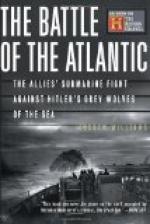There were oars in the boat. I had noticed these dumbly before, but now I drew them eagerly forth from the bottom, and quickly fitted them into the oarlocks. They were stout, ashen blades, unusually large for the craft in which they had been stowed, yet workable. The boat itself was a mere shell, scarcely capable of sustaining safely more than three persons, but with lines of speed, its sharp prow cutting the water like a knife blade. I shipped the useless rudder inboard, and chose my course from the stars. The north star was completely obscured by thick clouds, but the great dipper gave me my bearings with sufficient accuracy. To attain again to the west coast not far from where the great point projected outward into the Bay, and behind which the bark swung at anchor, required, according to my understanding of our present position, that I head the boat toward the southwest. I bent earnestly to the oars, and the speed of the craft was most encouraging, especially as my strength and energy seemed to increase with each stroke. My mind brightened also quite perceptibly, as the violent exercise sent the blood coursing anew through my veins. Before I realized the change I had become thoroughly convinced that the course I had chosen was the wisest one possible.
It was wild, and desperate, to be sure. I was not blind to its danger, and yet nothing else offered any solution. The only probable chance now for me to prove of direct service to the captive girl lay in being near her while she remained with these men. If, by any good fortune, she had thus far succeeded in escaping from Estada and his gang of ruffians, I would learn this fact more surely aboard the Namur than in any other way; and, once assured as to this, could certainly find some means of early escape from the ship. While, if she was captured and taken aboard, as was most probable, for me to be left behind on shore would mean her total abandonment. Better any risk of discovery than that. To be sure I had no plan of action devised, no conception of how a rescue could be effected. Yet such an opportunity might develop, and my one hope lay in being prepared, and ready. With the death of Sanchez, his second in command would undoubtedly succeed him; but would that be Estada, or would it be this other, the mulatto, Francois LeVere? More likely the former, for while buccaneers had operated under colored chiefs, a crew of white men would naturally prefer to be led by one of their own color. Indeed it was even possible that a controversy might arise, and a divided authority result. Discipline among such as these depended entirely on strength and ferocity. The most daring and resourceful became the chosen leaders, whose only test was success. Perhaps, in the turmoil, and uncertainty, arising from a knowledge of Sanchez’s death, and the jealousy thus aroused between those who would succeed him in command, I might discover the very opportunity I sought. These were some of the thoughts which animated me, and gave new strength to my arms, as I sent the dory flying through the water.




